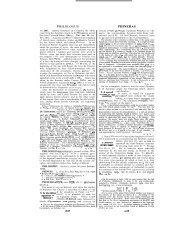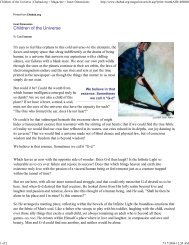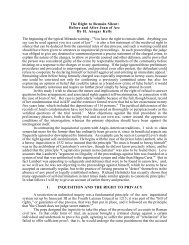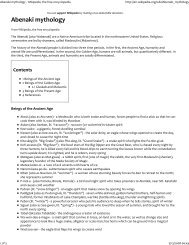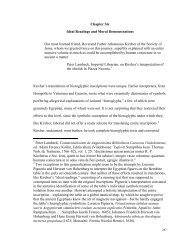sefi;g:v. - A Kabbalist walks into a bar, and the
sefi;g:v. - A Kabbalist walks into a bar, and the
sefi;g:v. - A Kabbalist walks into a bar, and the
Create successful ePaper yourself
Turn your PDF publications into a flip-book with our unique Google optimized e-Paper software.
SELEUCIDLE SELEUCIDLE<br />
Antiochus carried all before him, <strong>and</strong> made himself<br />
master of Phcenicia‘<strong>and</strong> <strong>the</strong> territory on both sides of<br />
<strong>the</strong> Jordan (Pol. 568f.), <strong>and</strong> wintered in Ptoleniais. In<br />
<strong>the</strong> following year, however, he was utterly defeated at<br />
Raphia, <strong>the</strong> most sou<strong>the</strong>rly Syrian city (217 B.c.), <strong>and</strong><br />
compelled to cede to Egypt all Ccelesyria <strong>and</strong> Phcenicia.<br />
In <strong>the</strong> meantime Achaeus had raised <strong>the</strong> st<strong>and</strong>ard of<br />
revolt in Asia Minor, <strong>and</strong> it cost a two years’ warfare<br />
round Sardis to overcome him (Pol. 7 155 ).<br />
Then followed an expedition to <strong>the</strong> east, in which<br />
Parthia <strong>and</strong> Bactria were invaded ; <strong>the</strong>se successes<br />
gained <strong>the</strong> king his surname (209 B.C. ). When Ptolemy<br />
Philopator died <strong>and</strong> Ptolemy V. Epiphanes ascended <strong>the</strong><br />
throne (204 B.c.), Antiochus 111. combined with Philip<br />
V. king of Macedonia, for <strong>the</strong> partition of <strong>the</strong> Egyptian<br />
kingdom (Livy, 31 14 ; Pol. 1520). In pursuance of <strong>the</strong><br />
scheme Antiochus invaded Ccelesyria <strong>and</strong> Phcenicia,<br />
<strong>and</strong> overran Palestine (Jos. Ant. xii. 33) ; <strong>and</strong> though a<br />
diversion caused by Attalus of Pergamum enabled <strong>the</strong><br />
Egyptians to reoccupy Palestine, <strong>the</strong>y were defeated<br />
(198 B. c. ) by Antiochus himself near <strong>the</strong> sources of <strong>the</strong><br />
Jordan, <strong>and</strong> driven out of <strong>the</strong> country. Jerusalem itself<br />
fell <strong>into</strong> <strong>the</strong> h<strong>and</strong>s of Antiochus (Pol. 1639). A peace<br />
was concluded in which it was agreed that Epiphanes<br />
should marry Antiochus’ daughter, Cleopatra, who<br />
should receive Ccelesyria, Phcenicia, <strong>and</strong> Palestine<br />
as her dowry (on this peace, see Holm, 09. cit.4339,<br />
<strong>and</strong> note on p. 368). Antiochus <strong>the</strong>n commenced<br />
operations in Asia Minor, with a view of recovering <strong>the</strong><br />
Greek cities <strong>the</strong>re as a whole, <strong>and</strong> more especially those<br />
of <strong>the</strong> S. <strong>and</strong> W. coasts, which had long been reckoned<br />
to belong to Egypt, but had recently been occupied by<br />
Philip under <strong>the</strong> terms of <strong>the</strong> secret alliance with Syria<br />
above-mentioned.’ The defeat of Philip by <strong>the</strong> Romans<br />
at Cynoscephalz brought Antiochus also face to face<br />
with <strong>the</strong> power of Rome (197 B.c.).<br />
Antiochus claimed not only sovereignty over <strong>the</strong><br />
cities of Asia, but <strong>the</strong> throne of Thrace also, in virtue<br />
of <strong>the</strong> victory of Seleucus over Lysimachus a century<br />
before him. The tension between him <strong>and</strong> Rome was<br />
increased when Hannibal, a fugitive from Carthage,<br />
sought asylum at <strong>the</strong> Syrian court (App. Syr. 4).<br />
After long negotiations war was declared between <strong>the</strong><br />
two powers in 191 B.C. The decisive battle took place<br />
in <strong>the</strong> autumn of 190 B.C. at Magnesia on <strong>the</strong> Hernius,<br />
<strong>and</strong> <strong>the</strong> motley host of Antiochus vas utterly defeated ;<br />
<strong>the</strong> Roman legions were never actually called upon, <strong>and</strong><br />
<strong>the</strong> victory which gave <strong>the</strong>m a third continent cost but<br />
24 horsemen <strong>and</strong> 300 light infantry (Momms. Hist. of<br />
Rome, ET, 1881, 22705).~ Allusion is made to<br />
<strong>the</strong>se events in Dan. 11 IO, <strong>and</strong> I Macc. 110 S6f: (see<br />
ANTIOCHUS, I ). Antiochus was compelled to renounce<br />
all his conquests N. of <strong>the</strong> Taurus range, which had in<br />
fact always been <strong>the</strong> boundary of effective Syrian power<br />
in this direction (Pol. 21 17 ; Diod. Sic. 29 IO ; Livy, 37 45).<br />
In consequence of this defeat <strong>and</strong> loss of prestige<br />
Armenia fell away from <strong>the</strong> Syrian empire (Strabo.<br />
528). In 187 B.C. Antiochus himself, marching <strong>into</strong><br />
Elymais, at <strong>the</strong> head of <strong>the</strong> Persian Gulf, in order to<br />
plunder a temple of Bel to replenish his treasury ex-<br />
hausted by <strong>the</strong> enormous war indemnity, was slain by<br />
<strong>the</strong> natives. of <strong>the</strong> district (Strabo, 744).<br />
Seleucus IV., Philopator (187-175 B.C.), son <strong>and</strong><br />
successor of Antiochus <strong>the</strong> Great, came to <strong>the</strong> throne in<br />
when Armenia had<br />
8. Seleucus Iv. difficult times,<br />
i187-175 B.C.). already revolted <strong>and</strong> <strong>the</strong> prestige of his<br />
country was dimmed. The Dower of<br />
Rome also overshadowed <strong>the</strong> East, <strong>and</strong> freedom of<br />
policy was almost impossible. Thus he was compelled<br />
1 It was probably at this period, or perhaps earlier, that<br />
Antiochus sent 2000 Jewish families from Mesopotamia <strong>into</strong> <strong>the</strong><br />
cities of Lydia <strong>and</strong> Phrygia, securing <strong>the</strong>ir loyalty by grants of<br />
l<strong>and</strong> <strong>and</strong> immunity from taxation.<br />
2 ‘With <strong>the</strong> day of Magnesia Asia was erased &om <strong>the</strong> list of<br />
great states; <strong>and</strong> never perhaps did a great power fall so<br />
rapidly, so thoroughly, <strong>and</strong> so ignominiously as <strong>the</strong> kingdom of<br />
<strong>the</strong> Seleucida: under this Antiochus <strong>the</strong> Great ’ (Mommsen, Z.C.).<br />
4351<br />
See Jos. Ant. xii.8 4.<br />
to forego <strong>the</strong> oppprtunity of interfering beyond \It.<br />
Taurus, in assisting 1’h;irn;iues of I’oritus against Eunicnes<br />
of Perganiiim (171) B.c., see hod. Sic. 2924). Yet he<br />
coiicluded a treaty uf alliance with Perseus of \Iacedonia.<br />
\Vith Egypt he lived outw



